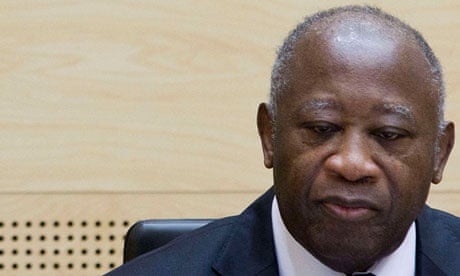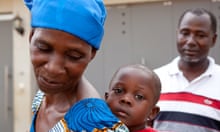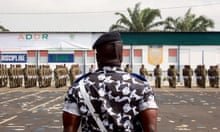Ivory Coast's military has carried out arbitrary arrests, illegal detentions, extortion, inhuman treatment and torture, Human Rights Watch claims, dealing another blow to hopes of reconciliation after last year's civil war. A report by the watchdog details a "brutal crackdown" following a string of attacks on military installations around the country in August. The attacks were allegedly committed by militants loyal to former president Laurent Gbagbo, who is awaiting trial at the international criminal court.
The resulting military action recalls the grave crimes of the 2010-11 post-election crisis, in some cases under the same commanders responsible for those abuses, Human Rights Watch said.
"The security threats to Ivory Coast are real, but widespread abuses by the military will fuel – rather than end – them," said Corinne Dufka, senior west Africa researcher for the charity. "The government should quickly show the determination to bring to account the soldiers responsible for torture, inhuman treatment, and criminality."
Alassane Ouattara was elected president after beating Gbagbo in a 2010 runoff with the backing of other parties. But the incumbent rejected the results, triggering a brief civil war in 2011 that forced him from power. Since then Ouattara, a former International Monetary Fund official, has been praised for overseeing an economic recovery but concerns have been raised over a lack of reconciliation between rival political factions. Since April at least 50 people, including many civilians, have been killed during seemingly co-ordinated attacks, which the Ivorian government has blamed on pro-Gbagbo militants intent on destabilising the country.
The response has been uncompromising. In August, members of the government's Republican Forces carried out mass arrests of perceived Gbagbo supporters almost daily in the Abidjan neighbourhood of Yopougon, Human Rights Watch said. "Without arrest warrants or individualised evidence, soldiers arbitrarily arrested young men in their homes, at neighbourhood restaurants, at bars, in taxis and buses, as they walked home from church, and at traditional community celebrations.
"Soldiers often arrived in neighbourhoods in military cargo trucks and forced 20 or more perceived pro-Gbagbo youth to board. Hundreds of young men appear to have been rounded up and detained, largely on the basis of their ethnicity and place of residence. Those arrested were often brought to military camps, which are not lawful detention sites for civilians under Ivorian law."
The charity said it had interviewed five captives who told how military personnel subjected them to beatings and floggings, generally during questioning related to the location of guns or alleged suspects, or to extract a confession. Several had scars allegedly from the physical abuse, and of other detainees returning to cells with bruises and open wounds. A former detainee at a military police camp described his mistreatment: "I was there for a week, and they questioned me every day but the last one. Each day they pulled me out and took me to another room for questioning‚ 'Where are the guns?' 'I don't own a gun, I've never held a gun.' Whack! They'd wrap their belt around their hand and hit me in the head, the face, the side.
"The metal [ring] of the belt was on the end they hit you with, [I think] to inflict the most pain. I had a lot of wounds, from when they'd strike you just right with the metal ring."
In August and September, the commander in charge of one detainment camp was Ousmane Coulibaly, better known as "Bin Laden", Human Rights Watch said. In a previous report on the post-election violence, it had named him as one of the Republican Forces commanders whose soldiers committed acts of torture and dozens of summary executions during the final battle for Abidjan in April and May 2011.
"The recurrent crimes committed under certain commanders should serve as a stark reminder of the consequences of impunity," Dufka said. "Military commanders who oversee abuses should no longer be untouchable, or else Ivory Coast will continue to be plagued by the grave human rights violations that have marked the last decade."
Human Rights Watch said it had briefed the Ivorian government on its findings and that officials stressed the gravity of the security threat and the need for solidarity with the military in the face of the repeated, violent attacks. They also promised an investigation into the abuses and indicated that anyone found responsible for torture or inhuman treatment would be prosecuted.


